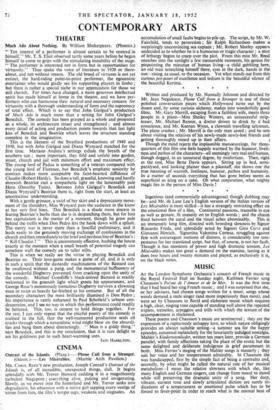CINEMA
Outcast of the Islands. (Plaza.)—Phone Call from a Stranger. (Odeon.)—Les Miserables. (Marble Arch Pavilion.) MR. CAROL REED 's new production, Joseph Conrad's Outcast of the Islands is, of all incredible, unexpected things, dull. It begins splendidly with Mr. Trevor Howard cadding it in a magnificently turbulent Singapore ; everything alive, pulsing and invigorating. Slowly, as we move into the hinterland and Mr: Trevor sinks into degradation, his obsession with a native girl sapping every vestige of virtue from him, the film's tempo sags, weakens and stagnates. An accumulation of small faults begins to pile up. The script, by Mr. W. Fairchild, tends to peroration.; Sir Ralph Richardson makes a surprisingly unconvincing sea captain ; Mr. Robert Morley appears undecided as to whether he is a humorous or tragic character ; a mist of lethargy begins to creep over the plot From this mist Mr. Reed snatches into the sunlight a few memorable moments, his genius for pinpointing the minutiae of human living—a child gabbling- here; an old man scratching himself there, eyes in the dark, hands in the sun—rising, as usual, to the occasion. Yet whatstands our_frain this curious pot-pouri of excellence and tedium is the beautiful silence of the beautiful Kerima.
-* Written and produced by Mr. Nunnally Johnson and directed• by Mr. Jean Negulesco, Phone Call from a Stranger is one of those polished conversation pieces which Hollywood turns out by the- dozen and, by some curious alchemy, makes into wonderfully good. films. Mr.. Gary Merrill, escaping from a faithless-wife, meets three people in a plane—Miss Shelley Winters, an unsuccessful strip- teaser, Mr. Michael Rennie, a doctor driven to drink by a7 bad conscience; and Mr. Keenan Wynn, a clownish travelling salesman. The plane crashes ; Mr. Merrill is the only man saved.; and he sets about visiting the relatives of his newly-made newly-lost friends and getting thoroughly mixed up in their affairs.
Though the mind rejects the implausible manoeuvrings, for three- quarters of this film one feels happily warmed by the humour, liveli- -ness and pathos of the characters—all seemingly very real and human, though dogged, to an unnatural degree, by misfortune. Then, right at the end, Miss Bette Davis appears. Sitting up in bed, semi- paralysed, and looking plainer than a pikestaff, she shows one the true meaning of warmth, liveliness, humour, pathos and humanity. In a matter of seconds everything that has gone before seems as superficial as icing on a cake. Oh what conjuration, what mighty- magic lies in the person of Miss Davis !
* Ingenious (and commercially advantageous) though dubbing may be—and Mr. de Lane Lea's English version of the Italian version of Les Miserables is most skilled—it has a strangely restricting effect on the emotional flow of a film. Continental passions, traceable in eye as well as gesture, fit uneasily on to English words ; and the chasm- fixed between the aural and the visual aches abominably. This is an immensely long film, directed with brooding slowness by Signor Riccardo Freda, and splendidly acted by Signori Giro Cervi and Giovanni Iiinrich. Signorina Valentina Cortese, struggling against fate with extravagant motions of distress, is considerably too tem- pestuous for her translated script, but that, of course, is not her fault. Though it_ has moments of power and high dramatic tension, Les Miserables makes too great a demand on the -stamina, lasting as it does two hours and twenty minutes and played, as exclusively it -is,_ on the black notes. •


































 Previous page
Previous page